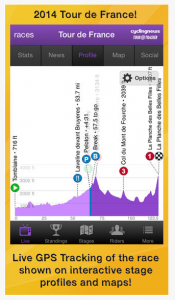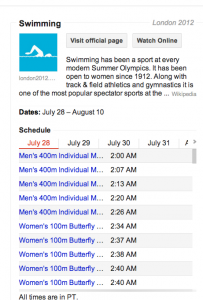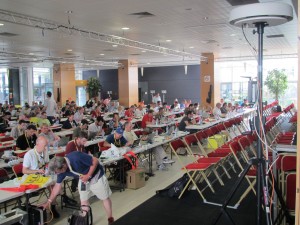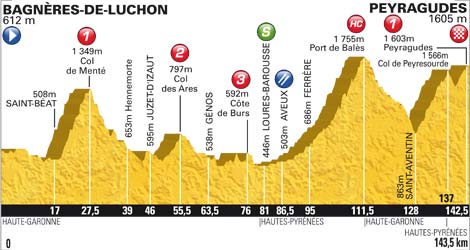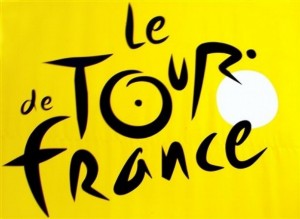Ever wanted to know what the Tour de France looks like from right in the middle of the pack? You now can see what it looks like for yourself, thanks to some on-bike cameras being used on a trial basis at this year’s race. Here is a link to a clip from Stage 1 that shows what it’s like to see a crash happen right in front of you. Great stuff, the kind of smart use of mobile technology that we’ve been waiting for since GoPro cameras hit the scene.
(For some reason it looks like the TdF is making some of these videos private, so watch them while you can. We also agree with what some commenters have been saying — what’s with the cheesy overdubbed music? Just use cycling action noise, please… thanks)
Of course, with technology advancements come things both good and bad, and if there is a crisis-about-to-happen trend it’s the proliferation of fans alongside the Tour de France trying to snap selfies with the racers in the background. Look, we get it: You are at a bucket-list type event, you spent hours by the side of the road waiting for the too-brief minute or two of action… so hell yeah, you’re going to snap a selfie to show everyone else how cool and important you are! Superb!
(VeloNews also has a report on the problem.)
The best #TDFselfie so far! @albertocontador @chrisfroome @letour @letouryorkshire pic.twitter.com/4XmoAW4hg2
— Woking Cycling Club (@WokingCC) July 7, 2014
The only problem is, over the last couple years, it’s become pretty obvious to anyone who watches Tour de France coverage on TV that the exuberant fans of old — usually fat old French guys who would sprint alongside the riders, on the steepest inclines where a human running can keep up with a bike for short distances — have now been replaced by a crew of idiots who know nothing about bike racing, but who want to be on TV. Or on the Internet. They dress up, they run in the road, they block the path of cyclists and motorcycles — every day now we hold our breath, hoping like hell there isn’t an incident where a fan takes out a leading rider, or far worse, a cyclist or fan suffers a terrible injury because some idiot was out in the middle of the road. Combine the idiot behavior with the turned-around selfie head not looking at what’s coming and you have a toxic stew. Who will save these jerks from themselves?
I’ve been around big bike races enough to know that there’s really no way of keeping these crowds completely controlled, short of putting up fences like they do for the last 1,000 meters in tour stages. Even then, people lean over the fences and cause crashes. I get it that part of the romance, the excitement of the Tour is the up-close involvement of fans. But these days it seems like it’s 90 percent self-important party clowns lining the roads, and not people who really care or understand the event. So far, it seems like the Tour has done little to try to tone down the on-road crowding. Let’s hope someone figures something out before there’s a race-changing or life-changing incident.
Crowds overwhelming cellular signals again?
This report is somewhat unconfirmed but in watching the NBC coverage live early this morning west coast time we heard one of the on-course reporters saying something about how team cars couldn’t communicate from the front of the pack to the back because they couldn’t get a cell signal — courtesy of the huge amount of fans lining the road for the stage into London. Shades of the Olympic road race! Guess they still haven’t figured out how to handle cellular crowds in the UK countryside.
TourTracker partners with CyclingNews: Best of both worlds!
We are also happy to see that our favorite live-action tour-following app, TourTracker, is now finally available for Tour de France coverage thanks to a partnership with CyclingNews. We’re happy for founder Allan Padgett and TourTracker… the best way to follow the biggest race in a mobile fashion. Unfortunately, the TourTracker app won’t have live video coverage — for that you still need to pay NBC extra, to the tune of $4.99 a day or $29.99 for the whole race. For mobile access only it looks like the charge is $14.99; not sure if there is also a per-viewing charge as well as a charge for the app.How do we feel about NBC milking cycling fans for chump change? It wouldn’t be so bad if you could ensure that Phil Liggett and Paul Sherwen were the only commentators heard, but from my short viewing stint today it appears that NBC has loaded up the announcer roster with those “other guys” that people generally can’t stand. My suggestion to Phil and Paul — hold some classes in the offseason to train the next generation of announcers! Please!
